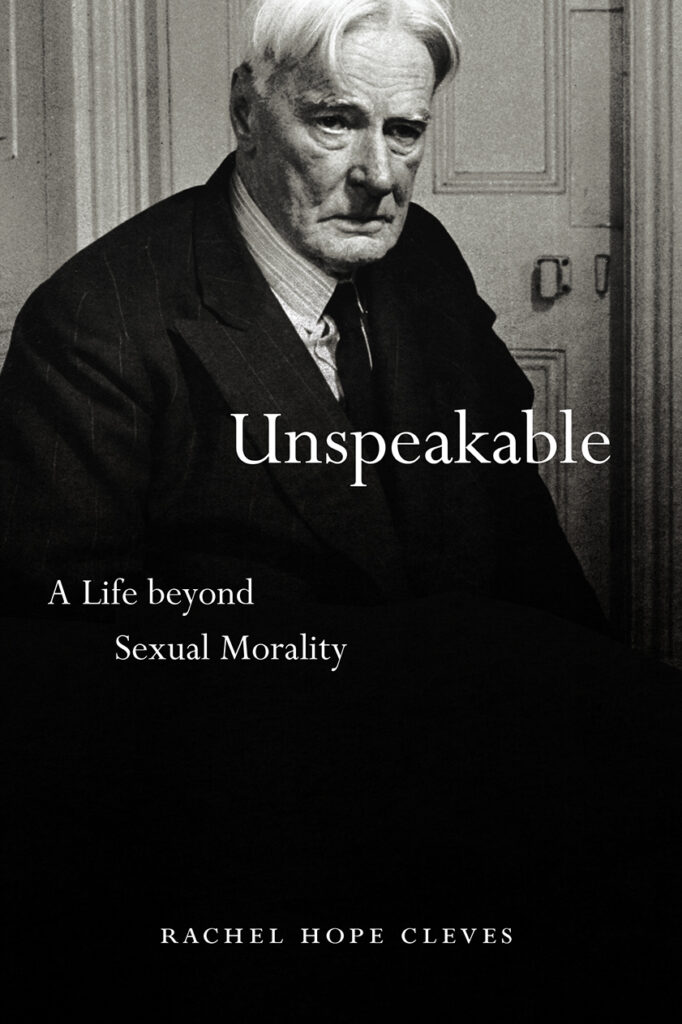This is the first post in our online symposium on Unspeakable: A Life Beyond Sexual Morality, Rachel Hope Cleves‘s new history of intergenerational sex as revealed by the sexual activities of the once well-known British writer Norman Douglas (1868–1952). As Cleves explains in the introduction, “political disincentives,” “visceral discomfort,” “cultural taboos,” and “the limitation of sources” have long “stymied research into adult-child sex.” In Unspeakable, Cleves insists that we must push through these barriers if we are to understand contemporary sexual politics. “Pedophilia is the third rail of contemporary culture,” Cleves observes. “There is no way to understand the third rail without grabbing hold of it.”
Rachel Hope Cleves has written an exquisite biography of sexuality. Unspeakable: A Life Beyond Sexual Morality focuses its attention on the life, literature and lusts of one man, early twentieth–century British author Norman Douglas. If you have not heard of Douglas, it is either because he was not as genius as his rival D.H. Lawrence or because he had sex with scores of children, mostly boys, and bragged about it. It might be a little bit of both (p. 2). But Unspeakable is not simply a biography of Douglas, for as Cleves journeys for eight decades with the irreverent pederast and iconoclastic writer across Southern Europe and beyond, she illuminates a yesteryear sexual world that rotated on differences in age and power; a sexual world that is neither alien nor ancient but uncanny.

Older men having sex with children was hardly the dominant norm in the many locations of Douglas’s life from the late 1800s to early 1900s—London, Capri, Florence, Naples, Antibes, and well beyond. Yet Cleves documents the ubiquity of adult-child sex, its centrality to literature and so many tourist economies, and the possibilities and problems intergenerational, transactional sex posed for families, marriages and authorities. Intergenerational intimacies and encounters were a cornerstone of Douglas’s cosmopolitan society, romanticized by the author and many in his cohort as revivals of classical pederasty. In his correspondences, for example, Douglas referred to his child lovers, often his de facto dependents and unofficial pupils, as “insps,” inspirations for his writing and his adventuring, his sense of freedom and his sense of purpose (p. 143). In Cleves’s excavation of archives and syntheses of voluminous texts by and on Douglas and his compromised reputation, we see how deeply and broadly the intergenerational sexual relation shaped Douglas’s social world and its conceptions of love, sexuality, art, adventure and power.
In what I found to be the most arresting passage of the book, Italian child prostitutes vie aggressively with each other for Douglas’s and his comrade’s attention and money. In one instance, an older boy “stoned” a smaller boy in order to take his place with the writer (p. 209). The devastations of World War I bolstered the market for child sex work in southern Italy, and Douglas and his friends paid little for the prepubescent boys who competed to join them on their eventful hikes. As Cleves documents, the market for sex with boys (and sometimes girls) “involved the active participation of hotelkeepers, parents, and the youth themselves” (p. 208).
What an astonishing drama of enthusiastic consent! Cleves draws upon this and similar scenes not to carry a brief for intergenerational sex, but nor does she write off boys’ expressions of erotic interest, even within constrained political economies, as “false consciousness” (p. 150). Rather, what Cleves retrieves from the letters of Douglas’s former boy lovers who laud the writer’s mentorship, love, and sexual attention is a sexual universe in which the naturalization and normalization of social inequalities engendered feelings of gratitude and pleasure we now find inconvenient.
In a 1978 radio interview about adult-child sex, French philosopher Michel Foucault insisted that “the child may be trusted to say whether or not he was subjected to violence.” Writer Guy Hocquenghem agreed, “listen to what the child says and give it a certain credence.” To be candid, these comments seem glib if not opportunistic, willfully ignorant of, ironically, power. But Cleves’s archival children, the men reflecting on their boyhoods under Douglas’s tutelage, poignantly illuminate a range of experiences and interpretations around sex and intimacy, testimonies that make sex between men and children neither wrong nor right, but profoundly compelling as an object of historical and epistemological inquiry. And as Cleves points out, too rarely do we hear from the children of history, let alone do we hear of their sexual practices and desires.
A more generous read of that radio interview would be that Foucault, Hocquenghem and actor Jean Danet were protesting the construction of “the pedophile” as a monstrous symbol for sexual danger and malignancy. Cleves’s reconstruction of Southern Europe’s sexual mores in the early twentieth century obliterates the “transhistorical” fiction of the pedophile monster, the adult man who is singularly, summarily, and spectacularly responsible for children’s sexualized suffering (p. 14). A creature envisioned outside the social boundary, the figure of the pedophile monster denies the dynamism of sexual morality, “effaces the prevalence of sex between adults and children” (p. 10), “casts children’s ordinary experiences as unbelievable or unspeakable” (87), and mystifies children’s suffering under the ravages of industrialization and capitalism.
Ingeniously, Cleves concludes each of the four parts of her monograph with a “reflections” section that steps back from the details of Douglas’s travails to offer her own normative meditations, her avowed ambivalences, toward her subject.
In the second of those reflections, as Cleves grapples with, and as she encourages her readers to grapple with, the inconvenient passion and praise proffered by Douglas’s young lovers, she writes:
If consent is defined according to contemporary understandings as predicated on a relatively equal distribution of power between two agentic individuals … then pretty much all historic sexual encounters involving men and women are precluded. Contemporary definitions of consent do little to help historians differentiate the past, which was defined by inequalities, and at the same time capacitated a wide range of interactions from violent assault through enthusiastic mutuality (p. 151, emphasis added).
Elsewhere in the book Cleves avers that, historically, the power imbalances between husband and wife were not so different than those between adult and child; the cultural construction of the “pedophile monster” also obscures continuities of inequality across social relations (p. 86).
(As well, the child’s sexual labor was a reprieve from physical labor – or sex with a well-to-do gentleman beat hunger or poverty (p. 57). As Michael Denning has famously remarked, “under capitalism, the only thing worse than being exploited is not being exploited;” does the aphorism apply to children? Never?)
But I want to question the assumption that our contemporary consent paradigm of sexual ethics is “predicated on a relatively equal distribution of power between two agentic individuals.” Undoubtedly, that is the running assumption for much popular discourse and activism anchored in affirming and repurposing consent. But there is a competingly powerful cultural assumption, inherited from Lockean liberalism , that consent legitimates unequal relations of power and property. Granted, Locke wasn’t talking about sex. Yet the appeal of consent in the liberal’s (or for that matter, conservative’s) sexual ethics has much to do with the fact that the performance of consent is supposed to transform rape into sex despite inequalities of money, power, age and/or gender. #MeToo notwithstanding, I would qualify the assertion that our “current moral code … limits appropriate sexual encounters to those between two adults of roughly equal status” (p. 14). Presumably, Prince William holds more power than Kate Middleton, even after she was promoted from mere civilian to Duchess. Nobody objects to their intimacies nor should they. What I am getting at is that consent discourse is not so much “predicated on a relatively equal distribution of power” as it is predicated on an assumption of moral equality—girls and women are not properties of their fathers and husbands but moral agents, rights-bearing subjects whose rights are (imperfectly) protected by recognizing their power to proffer or withhold consent.
And so the question for us, for Douglas, and maybe for Cleves, is: can an adult engage in sexual contact with a child and respect her or him as a moral agent, a moral equal, whether or not that child is legally (or ontologically) capable of consent? Not to ventriloquize too much, but I think Cleves would answer yes (and so would I; I’m not sure Douglas would care, and that’s exactly the problem), although only under certain historical conditions and in specific relational contexts, which is to say a world no longer ours. At times, Cleves’s Douglas seems to embody a mythic, even glorious pederast of antiquity, who bestows wisdom upon his young lover and cultivates his ambitions (child as moral agent). At other times, Cleves’s Douglas is running from rape or assault charges, waxing on that the non-solipsistic life is not worth living (child as tool). For once Cleves retires the gothic moralism of the monster, she and we must confront faults and frailties that are embarrassingly human.
It is one matter to test and tease the sexual morality of your historical present. Cleves captures the zeitgeist in her third set of reflections: “sex between men and children might be wrong, but it was less wrong when Douglas did it, because it’s Norman Douglas!” (p. 217). It is quite another matter to find yourself a sexual impossibility, aged out both by cultural transformation and by, well, old age. Cleves observes that, along with the rise in fascism, “[p]ederasty became unspeakable, a forgotten anachronism. This rapid and complete discrediting of the sexual practices that had defined Douglas’s life left him struggling to survive during his final years, and left his fans and friends struggling to find the language to defend him” (p. 218).
Cleves’s Unspeakable is a spellbinding account of tragedy, when one outlives their genre, toggling instead between uncelebrated and unintelligible, criminal and creep. Nor is Cleves hyperbolic here; the historical record she so meticulously accumulates substantiates the claim. As pederasty first devolved and then disappeared as a social and sexual category, Douglas’s life withered away, like the promise of his legacy.
 Joseph Fischel is a theorist of sexual and social justice whose research traverses normative political theory, feminist and queer studies, and public law scholarship. His manuscript-in-progress, on the life and afterlife of sodomy law in New Orleans and beyond, advocates for a paraidentitarian politics of sexuality.
Joseph Fischel is a theorist of sexual and social justice whose research traverses normative political theory, feminist and queer studies, and public law scholarship. His manuscript-in-progress, on the life and afterlife of sodomy law in New Orleans and beyond, advocates for a paraidentitarian politics of sexuality.

NOTCHES: (re)marks on the history of sexuality is licensed under a Creative Commons Attribution-NonCommercial-NoDerivatives 4.0 International License.
Based on a work at www.notchesblog.com.
For permission to publish any NOTCHES post in whole or in part please contact the editors at NotchesBlog@gmail.com




